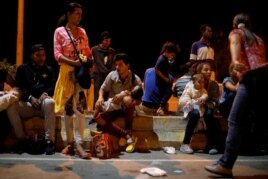22 October, 2019
Freddy Brito had just finished singing on a bus in Peru's capital. He was crossing a street on his one good leg when the driver of a taxi sped up and turned his car toward the singer.
"Veneco!" the driver shouted, using an insulting term for Venezuelans. "Get out of here," he added.
As large numbers of people flee Venezuela's collapsing economy, the warm welcome many migrants received in other countries has begun to wear thin.
In recent weeks, several videos on social media in Peru have shown migrants being attacked or threatened. This has fueled concerns that xenophobic attacks on the new arrivals are increasing.
Many Venezuelan migrants and refugees have settled in other South American countries. United Nations' records point to an increase in the number of Venezuelans who reported facing discrimination in those countries.
A recently established telephone hotline reported 500 incidents in two weeks.
"It has been rising in recent months," said Federico Agusti. He serves as the U.N. refugee agency's representative in Peru.
The incidents of discrimination include being expelled from housing, threats of violence and actual attacks.
In one video, a young Venezuelan woman is whipped by attackers on a dark street. In another, men in what appear to be military clothing announce on a loudspeaker that they will not let "another miserable Venezuelan" into Peru.
In a third video, a young man appeals to several officers standing around him not to take away the chocolate he is trying to sell to earn some money.
"How am I going to eat now?" he cries out to the officers.
Those and other incidents have many people worried. Human rights experts warn that a number of conditions normally linked to xenophobia are happening.
Several nations with large numbers of Venezuelan migrants are experiencing political and economic problems. They are also announcing new policies aimed at restricting migrants.

Venezuelan migrants wait outside the Ecuadorian-Peruvian border service center, to process their documents and be able to continue their journey, on the outskirts of Tumbes, Peru June 15, 2019. (REUTERS/Carlos Garcia Rawlins)
When Peruvian President Martin Vizcarra recently dismissed the nation's legislature, one angry opposition lawmaker took the microphone to say that Venezuelans "needed to leave Peru!"
"It's not surprising that rising levels of people arriving to countries with economies that are not prepared to absorb that work force lead to this situation," said Tamara Taraciuk Broner. She is the acting Americas deputy director for Human Rights Watch. "It's one of the biggest concerns we have," she added.
Brito and his wife fled Venezuela a year ago as it became increasingly difficult to feed their six children. Once part of a popular music group, Brito said Venezuela's economic crisis made it impossible for his musical career to grow. The family also worried about their security in a country where robberies and kidnappings are common.
Having lost a leg while being shot while at a party several years ago, Brito said that some people once tried to steal his replacement leg as he sat near his home.
"That leg must be worth something!" he remembered them saying. After taking his jewelry, they tried to remove the leg, but could not.
Lately, he cannot wear the leg because he cannot find the skin protector he needs. He moves around Lima on one foot.
"I feel like I'm in the air," he said, laughing.
Ruth Guillen, his wife, took a job as a beautician when they first arrived. She said some people refused to let her touch their hair because she is Venezuelan. She said the family has been forced to move twice because they are Venezuelan. They now live in a religious group's shelter.
"You come here with dreams," she said. "And when you arrive you find something else."
An estimated 4.5 million Venezuelans have fled their homeland in recent years, report U.N. officials. About half of those are now living in Colombia or Peru.
The U.N. refugee agency reports that 46.9 % of Venezuelan migrants across Latin America say they have felt discrimination, up from 36.9% earlier this year.
The Reuters News Agency reported this story. Susan Shand adapted it for VOA Learning English. George Grow was the editor.
Write to us in the Comments Section or on 51VOA.COM.
________________________________________________________________
Words in This Story
to wear thin – phrase to become less acceptable
xenophobic – adj. showing a dislike for or fearing those from another country
hotline – n. a direct telephone line set up for a reason
whip – v. to hit or beat with a small instrument or stick
microphone – n. an object used to make a voice louder
absorb – v. to take in and accept